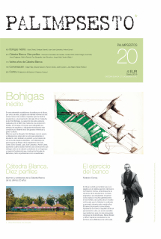Devil is in the details
DOI:
https://doi.org/10.5821/palimpsesto.20.8757Keywords:
Detail, Scale, Form.Abstract
It wasn’t even my third week in Barcelona when Carlos asked for a facade section at 1:10 scale of the project idea. That was a surprise. Not only in terms of changing the usual order in the development of the project, but because I came from a context in which the enemy was the mannerism already present since the 70s; in such context, starting the project by the detail seemed highly suspicious to me. I could not understand how going back to detail could make sense in a world that we already recognized as changes and flows in constant circulation. What resistance to it could “the detail” detail ? In this my last career course, my training until then based on diagrams and strategies seemed much more coherent to me, and that other thing seemed to me like a kind of self-absorption in the excessively particular, or worse, as a castling of the architects about themselves and their own ‘styling’ in the face of convulsing times. But the insistence was huge. Carlos repeated as a mantra that what interested him most in architecture were ‘the 3 centimeters’, those in which the materials are found, and he expressed this in the talks with which he presented his work, in the construction visits that we made throughout that year ...
In these 20 years since that course, this need for coherence across the different scales of the processes has led a good part of my informational, academic and professional career.
Downloads
Published
Issue
Section
License
PROTECTION AND INTELLECTUAL PROPERTY CRITERIA
Authors whose work is published in en Palimpsesto agree to the following terms:
1. The author retains the copyrights and guarantees the magazine the right to apply a Creative Commons Attribution-NonCommercial-NoDerivatives (CC BY-NC-ND), which permits others to share the work with acknowledgement of authorship.
2. The author may establish additional agreements of his or her own accord for non-exclusive distribution of the article published in the magazine (for example, in an institutional repository, or published in a book).
3. Electronic distribution of the work by the author(s) is permitted and encouraged (for example, in institutional repositories or on the author’s own website), prior to, and during the submission process, as this can generate productive exchanges, as well as earlier and greater citation of the published works (see The Effect of Open Access) (in English).
4. The author or provider of the material submitted for publication authorizes Palimpsesto to publish, with no obligation whatsoever (financial or otherwise) to the content of said material, be it in paper or digital format, or in any other medium.
5. The author or provider guarantees that he or she is the owner of the Intellectual Property rights to the contents provided, which encompasses the text and images/photographs/photographic works incorporated in the article.
6. The author or provider, exempts Palimpsesto magazine of all and any responsibility relating to violation of copyrights, thereby committing himself or herself to undertaking all efforts to assist Palimpsesto magazine in defence of any accusation, extra-judiciary, and/or judicial measures. Likewise, the author or provider will assume payment to Palimpsesto of any sum or compensation that must be paid to third parties for failure to comply with these obligations, be it the result of judicial, arbitrary or administrative decisions.
7. The submission of the texts by authors implies automatically a declaration of non plagiarism of its contents







